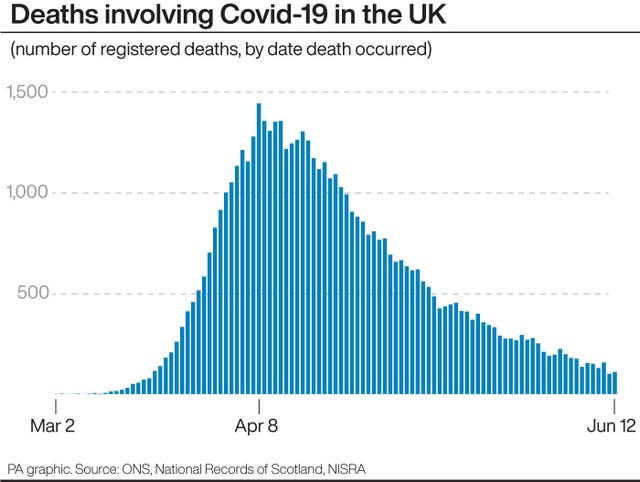Walk-in centres for coronavirus (Covid-19) testing are to be set up to make it easier for people without cars to get tested for the virus.
Six centres are being trialled in Newcastle, Rochdale, Leeds, Brent, Newham and Slough, with the latter described as a hybrid drive and walk through.
The exact location of the centres has not been confirmed by officials but one is understood to be on a basketball court, and there have been reports they will spring up in empty shops and car parks.
A source at the Department of Health and Social Care said officials were working on “walk through testing sites in England for people without cars”.
The source said that previously the push was to have testing sites out of the way so there were not “huge” numbers of potentially infected people travelling into the centre of towns.
But they added that now incidence is lower, they can look at ways to safely provide testing “in the heart of communities”, in a way that is more easy and accessible to people.
It comes as the latest NHS Test and Trace figures show that 24% of people (5,062) who tested positive for Covid-19 between 28 May to 17 June and who had been transferred to the tracing system were not reached.
This number includes people who the service was unable to reach because there had been no response to text, email and call reminders. It also includes people who were reached but declined to give details of close contacts.
A further 3% of people (681) could not be reached because their communication details had not been provided.
A total of 20,968 people who tested positive for Covid-19 in England had their case transferred to the contact tracing system during the first three weeks of its operation, according to figures from the Department of Health & Social Care.
Of this total, 15,225 people (73%) were reached and asked to provide details of recent contacts.
During the first three weeks of Test and Trace, 113,925 people who had been identified as recent close contacts of people who had tested positive for Covid-19 were reached through the tracing system.
This was 89% out of a total of 128,566 identified contacts.

The remaining 14,641 (11%) were identified as close contacts but were not reached.
The weekly figures on Test and Trace, which are subject to revision, currently show that in the seven days to 17 June, a total of 82% of close contacts of people who had tested positive for Covid-19 were reached and advised to self-isolate.
This compares with 91% of close contacts in both weeks one and two.
The weekly data also shows that in the seven days to 17 June, 26% of people who had been transferred to the tracing system after testing positive for Covid-19 were not reached, up from 22% in week two – though these figures could change.
The latest data from the Test and Trace service comes after the prime minister continued to defend it from criticism.
Boris Johnson insisted the system is a “cluster-busting operation” that would quickly tackle any localised Covid-19 outbreaks after he was challenged by Labour leader Keir Starmer over a discrepancy between the estimated number of coronavirus cases in the UK and those covered by Test and Trace.

Johnson said: “What NHS Test and Trace is doing is contacting the vast majority of those who test positive and their own contacts and getting them to self-isolate, and it is a formidable achievement.”
Health secretary Matt Hancock refused to give a date on when the controversial test and trace app would be made available, but said the government is “going to make it work”.
It is understood senior officials believe that having no app is better than having an app that is not guaranteed to work properly.
Meanwhile, the Daily Telegraph reported the government will announce next week that pupils will not be expected to adhere to social distancing while in school, and the current “bubbles” of 15 pupils can be increased to include entire classes.
Schools will instead be asked to focus on introducing strict hygiene regimes and limiting the time children mix with others outside their class or year group.
Responding to the article, the Department for Education said it would publish “further information and guidance next week to help schools prepare for a full return in September”.
There are also reports that the first set of so-called “air-bridges” are to be announced this weekend, detailing holiday destinations where Britons can visit from 4 July.
France, Italy and Spain are all expected to be included in the first tranche of bridges as they are deemed to be “safe nations”, the Sun, Times and Daily Telegraph reported.

















